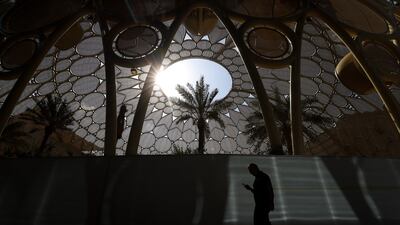In the run-up to the Cop28 global climate summit, which opens today in Dubai, Dr Sultan Al Jaber, Cop28’s President-designate, warned the world that when it comes to climate action, “there is simply no time left for delays”.
Humanity has made considerable progress in the fight against climate change since 2015, when 196 countries adopted the Paris Agreement, a legally binding treaty, at Cop21. Back then, our planet was on track to experience global warming of more than 3°C by the end of the century. Thanks to a dramatic increase in renewable energy investments, ambitious net-zero targets and a broader focusing of minds on sustainability, that figure is now something more like 2.5°C. The International Energy Agency predicts global carbon emissions to peak in this decade – not sometime in the 2040s, as per its earlier estimates.
Even so, the world is a long way off from the target of 1.5°C agreed in Paris, and the cost of a failure to close the gap would be catastrophic for hundreds of millions – if not billions – of people. Speaking from Dubai on the eve of the summit, Dr Al Jaber called on Cop28’s attendees to “raise the maximum ambition possible”, to bring everyone – including carbon-intensive energy companies – to the table, and to “bridge the gap between the global north and the global south”.
Today, 101 countries have set net-zero targets – plans to reduce or remove as much carbon from the atmosphere as they emit. That number must go up, but raising it – and ensuring it brings results – should involve drawing in the private sector, which is the ultimate source of the bulk of global emissions.
While reducing the world’s dependence on fossil fuels has understandably dominated the sustainability conversation in recent decades, oil, gas and other carbon-based sources still comprise 80 per cent of the world’s energy supply, and they will continue to be essential if the other great challenge of our time – global poverty – is to be solved. So even as the world transitions towards renewables – countries, including the UAE, are calling for a tripling of renewable energy capacity to be agreed at this Cop – other critical pathways to net zero must be pursued with equivalent vim and vigour.
Chief among these are carbon dioxide removal (CDR) and carbon capture and storage (CSS). The two approaches are related; CDR is removing CO2 from the atmosphere, whereas CSS involves capturing it – from, say, power plants or industrial sites – before it gets there and storing it away, usually underground. The technologies needed for both remain in their nascent stages, and getting to a 1.5°C world will require capacity in these areas several orders of magnitude greater than what exists today. Getting there must become a priority.
At the same time, these pathways must not be allowed to distract from or deter emissions reduction, which will inevitably remain the bedrock of the world’s climate strategy. To that end, maintaining unity and solidarity among nations towards developing their emissions goals further – even as conversations about responsibility and economic sovereignty become heated – will be crucial at this Cop. It will also be critical in the much-needed discussions around adaptation, as poorer, vulnerable and – in most cases less culpable – countries seek assistance in safeguarding their populations from rising sea levels and other climate-related challenges.
The question that will underlie all of these discussions, of course, is how to pay for all of this. “Cop28,” noted Simon Stiell, executive secretary of the UN Framework Convention on Climate Change, the summit’s governing body, “will be a finance Cop.” A “loss and damage” fund agreed at last year’s summit in Egypt must be fully funded. The greening of industries hitherto maligned must be incentivised. And the horizon on which frontier technologies currently lie must be brought into clearer view.
It is fitting, then, that this year’s climate summit should happen in a place famous for sitting at the intersection of finance and innovative thinking, and the developed and developing worlds. An inclusive Cop, bringing government, private sector, international organisations, NGOs and philanthropists is meeting at a critical time. The conditions are right for the world to change in Dubai over the next fortnight, if Cop28’s delegates are willing to seize the moment.


